f you’ve ever felt ashamed for nosily inquiring about someone’s sex life, you might find some relief in the fact that the oft-forgotten retort to “curiosity killed the cat” is “but satisfaction brought it back.” It’s that gratification that has motivated people, from Freud to the editors of Cosmo, to divulge what goes on in the privacy of people’s bedrooms (or elsewhere). These anecdotes also have the added benefit of making us all feel a little less alone.
We decided to keep feeding the voracious appetites of the public and find out what the most common sexual problems are by consulting sex therapists and specialists across the country. And our suspicions were confirmed: Sex is a multi-layered, complex act that can be affected by a host of factors, all of which vary from couple to couple — but there are some problems that sexually active people often face.
The good news is that, most of the time, these issues can be rectified by either a visit to the doctor or a little communication. Below we’ve rounded up the nine problems sex experts told us they see most frequently. We promise we won’t judge you for being curious.
“Discrepancy in desire between partners is the most common type of issue that I deal with. With female clients, four major factors usually underlie the problem. First, it could be an organic physical issue, like pain during intercourse. The second cause could be chronic fatigue or stress, which may be related to childcare or financial stress. In these cases, solutions are dependent upon lifestyle changes, but teaching the art of good communication between partners can help. The main two causes I see, however, are ones that have their origins in the person’s sexual and psychological history or ones that emanate from the relationship itself — sexual desire can often be a barometer of the health of the relationship.”
-Peg Hurley Dawson, LMHC, CST
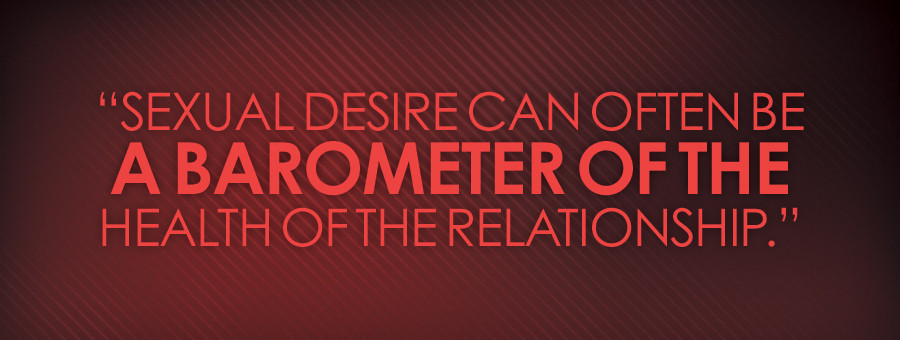
“The most common sex problem I see is lack of sexual desire, and I particularly see this with couples, where one person has much higher sexual drive or desire than the other partner. The solution depends on a number of factors. First, I want to find out how long this situation has been going on and what were the circumstances in which it first started. Often, the sexual problem is caused by relational issues — feelings of anger, resentment, betrayal and so on — that need to first be resolved before the sexual issues can be addressed. I may have to help a couple learn how to express their needs directly or how to see each other’s point of view from a less reactive position. Once the relationship is repaired, the sexual difficulties may often improve on their own.”
-Michael Aaron, PhD
“The most common sexual problem women in same-sex relationships bring to my couples counseling sessions is when one woman wants more sex than the other. While this may seem like a typical issue for all couples, it can hit lesbian couples harder than heterosexual or gay male couples. This is because in women-only relationships, no one in the couple has been socialized to be a sexual pursuer or to deal with sexual rejection. When women are rejected, they may give up on seeking sex in the relationship altogether. In comparison, men may have learned early in life how to cope better with rejection. Just consider how boys are challenged by their first school dance request.
Counseling around sexual rejection can create new paths for sexual health and can normalize the experience. When we understand how gender culture has created barriers, lesbian couples can explore their comfort with creating their own identities and passion in the art of lovemaking and sex.”
-Cindy Bink, LMHC

“One of the most common problems with couples is that of differing levels of desire. Often people begin a relationship equally excited, but after time, things may fade for at least one of them. So the detective work begins when I meet with the couple together and then alone. I may hear that one dislikes the style or approach of the other — or a smell or an attitude. They may have resentments that need to be dealt with before they allow for that level of vulnerability.
We deal with the lack of healthy communication by teaching communication skills. We discuss likes and dislikes, needs and desires, body parts and how to touch them, sensate focus, or touching, exercises and what is pleasurable. We may deal with old emotional wounds that are in the way of progress. Each couple is different and brings their own challenges, but the goal is to have a greater appreciation and knowledge of their own and their partner’s desires. It is a fascinating time to watch people grow.”
-Kassi Corley MSW, LCSW

“In my practice, the most common sexual problem is mismatched sexual desire, with one partner wanting more frequent sex than the other. The solution varies from couple to couple. For couples with young children and little time, it might be agreeing to schedule sex a certain number of times each week. We’ll talk about ways to make the sex that they have fun and romantic — or whatever they enjoy — even though sex is planned. For another couple, it could be that the low desire partner isn’t speaking up about what would make having sex more frequently something to look forward to, like engaging in more oral sex or trying some light power play with fuzzy handcuffs and a blindfold. I also work with developing empathy. Often the higher desire partner feels that their needs aren’t understood, so I point out that being the low desire partner isn’t much of a party either. They sometimes feel guilty or inadequate because they can’t meet their partner’s sexual needs.”
-Stephanie Buehler, PsyD
2. No Time For Sex
“‘No time for sex’ is the most common problem I hear in my psychotherapy practice. We love one another, but we have no time for intimacy and sex in our busy lives. But this chief complaint is misleading, because sex is not a time issue. Couples who present this problem often have relationships characterized by more complex emotional and physical sexual disorders, like lack of desire, erectile dysfunction, painful intercourse, negative body image, premature ejaculation and interpersonal conflict.
I find that many couples collude about their relationship and sexual problems. They take the road of less confrontation and avoid or deny that these conditions exist by repeatedly saying they are just too busy for sex, rather than expressing and exploring their intimate needs and wishes with each other.”
-Cathy Beaton, M.S., NCPsyA
3. Medical Illness
“I work with individuals and couples who struggle with a range of sexual problems that are primarily related to illness and medical treatment. I am often struck by the fact that illness or medical treatment is the straw that breaks the camel’s back — that is, when I do a sexual history with my patients, I often hear things had been declining for a while and that sex was not what it used to be. One of the most common problems is low desire. This is very frustrating for both patients and clinicians because there is no ‘little blue pill’ for desire.
The problem of low desire often sits right at the intersection between mind, body and relationship, and this is not always easy to hear in our quick fix culture. But there are many ways to approach the problem. I emphasize that the process itself is part of the solution.”
-Sharon L. Bober, PhD
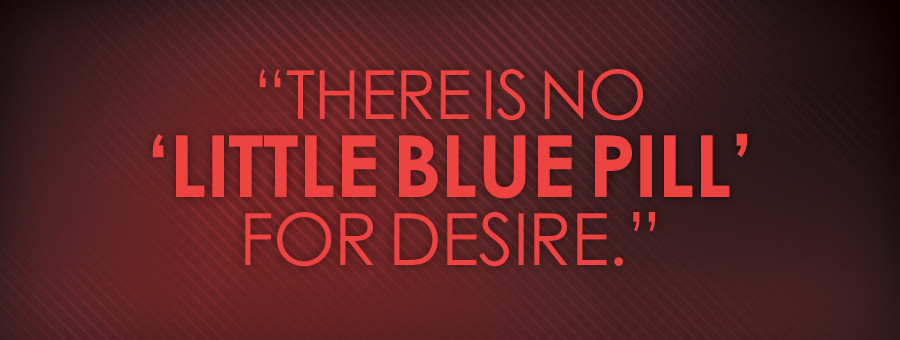
“Because I work within a large academic medical center, many of the sexual problems that I treat have a medical factor involved, like erectile dysfunction related to diabetes or prostate cancer treatment. Yet even with these problems, the most common underlying problem in sexual dysfunctions is the lack of communication. It is usually the lack of open communication that turns what could be a minor setback or change in the sexual relationship into an escalating problem. A frequent pattern that I see is a vicious cycle of anxiety and sexual difficulties, fed by the inability to talk openly about the issue and how to address it. This cycle often ends in the avoidance of sex, abetted by an avoidance of talking about sex. The origin of communication problems about sex is most often fear: fear of embarrassment, fear of rejection or fear of failure.
This is why the treatment of sexual dysfunctions is usually much more effective if both members of the sexual relationship are involved. For most couples presenting with sexual problems, half the work is done simply through helping them to share with each other their feelings, their expectations, their fears and their hopes for the sexual relationship. It includes exploring their conscious and unconscious expectations about a sexual relationship. The communication also takes the form of helping couples to give each other appropriate feedback about their sexual experiences.”
-Richard A. Carroll, PhD
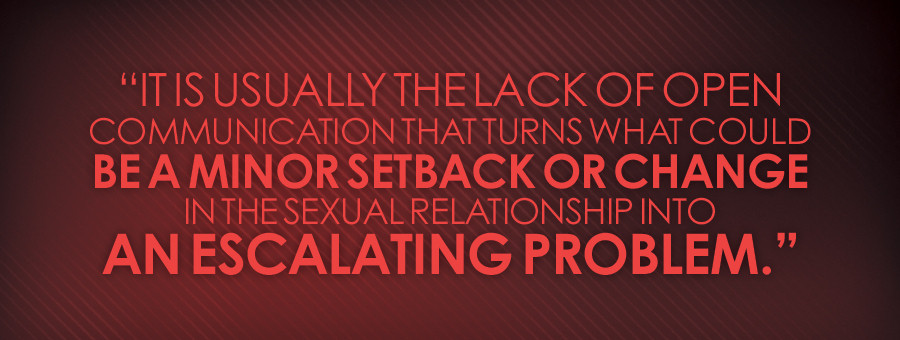
4. Erectile Difficulty
“The most common sexual issue that clients in my practice present is erectile difficulty. If there is no medical basis or contribution to the erectile difficulty, usually anxiety is interfering with the man’s capacity to become and remain aroused. If the man is in a committed relationship, treatment for this usually involves having the man and his partner do a graduated series of touching exercises, which are designed to help men physically connect with their partners without any pressure to perform sexually.
For clients who are not partnered, approaching this problem can be a bit more challenging. The man can be given exercises to do when masturbating to help him become more confident about his ability to regain his erection if he loses it when in a sexual situation. He also can be helped to shift his focus away from worrying about whether he will have any difficulties becoming and staying erect — something in itself which contributes to erectile difficulties — to aspects of his sexual interaction that he enjoys and finds pleasurable. He can also give himself the opportunity to get to know someone he is dating before attempting to be sexual and try to not feel that a first sexual encounter necessarily has to proceed to intercourse, rather than enjoying other ways of being sexual.”
-Bruce Berman, PhD
5. Decrease In Sex
“The most common problem I encounter as a sex therapist is when a couple is either unhappy with the decrease in their sexual frequency or the fact that they have stopped all sexual activity. The solution is not a one-size-fits-all model, because there are numerous reasons that couples decrease or stop having sex, like erectile dysfunction, pain during intercourse, boredom with the sexual routine, loss of libido due to illness, medications or stress in the relationship.
What I do offer as solutions are exercises that I have devised for the couple to do at home to see if they can begin to touch one another erotically a bit at a time. I may also brainstorm with them how to carve out personal time for themselves as individuals and as a couple so that they approach each other with renewed interest in themselves and in their partner — sometimes people are bored with themselves and don’t feel confident about their sexiness.”
-Sari Cooper, AASECT Certified Sex Therapist and Sex Coach
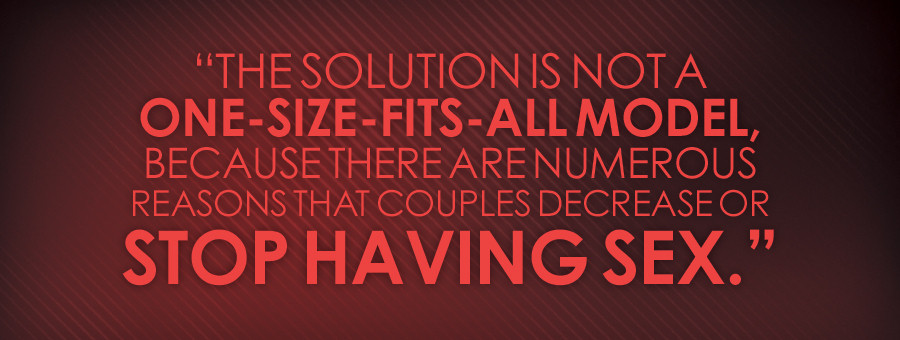
“By far, the most common sexual problem lesbian couples bring to me is that they’re not having sex at all. For some, it’s been months; for many, it’s been years. The reason they show up to talk about this is that one person is not happy but the other is fine. While heterosexual couples often have this problem, a national sociological survey found that, after 10 years together, 67 percent of heterosexual and only 15 percent of lesbian couples still had sex at least twice a month. So it’s a really big deal in our community.
The solution is first, to get some accurate information about female sexual desire, and secondly, make a plan with your partner about how often you’ll have sex. The early romance passion that feels so spontaneous is actually fueled by very intentional behaviors — planning dates, setting up sexy scenarios, whispering sweet compliments and fantasizing about sex. You actually get yourself turned on by all the thinking, planning, and imagining sexual scenes. The problem happens when you stop doing that, and expect some magical sex drive to carry your intimate relationship forward. It won’t, because most of us don’t have that physiological, testosterone-driven need to have sex. We just like it once we get started.”
-Glenda Corwin, PhD
“I believe the most common sexual problem is lack of interest or low desire, and I see both men and women who experience this problem. The solution depends on the cause. First, I do an assessment to try to determine why the individual is experiencing low desire. If partners are not getting along or lack emotional intimacy, often one or both partners loses interest in sex. In that case, therapy would start with working on the relationship. This is not always sufficient to resolve the sexual problem, but if there are relationship problems, it’s almost always necessary to solve those.
In other cases, the low desire may be a result of a sexual script that doesn’t meet the needs of one of the partners. That is, the couple has not developed a mutually satisfying sexual script, a way to make love that works well for both partners. There are a number of reasons why this might be the case, but poor sexual communication is often a reason. For that, I use a series of exercises done at home, which focus on touching.”
-Sandra Byers, PhD

6. Pain During Sex
“The most common referral to me is pain during sexual intercourse. This is not likely to be the most prevalent sexual dysfunction, but I see it frequently because I have been doing research on this problem for many years. The basic principle behind my research and treatment approach is to conceptualize this problem as a pain disorder rather than as a sexual dysfunction — the pain is not sexual but the sex is painful. There are a number of justifications for this approach, but a basic one is that the pain can almost always be induced in non-sexual situations, like gynecological examinations or tampon insertion.
There have been two traditional approaches to treating pain during sexual intercourse. The first is to look for a physical cause in the genitalia. The second is to attribute the pain to sexual abuse or trauma or an emotional state, such as depression or anxiety.”
-Irving Binik, PhD

7. One Partner Has An Affair
“The majority of my practice is working with couples at the brink of breakup. Most often there is, or has been, a newly discovered affair. Then there are the couples who know there is chronic long-standing sexual dissatisfaction. From my point of view, the sexual problem is the same in both circumstances: Each partner in these couples might typically be diagnosed with inhibited sexual desire or arousal disorder.
My treatment approach begins by exploring the history of their relationship and, more specifically, the history of their sexual relationship. Has this couple ever had really great sex? If yes, the question is why/how did it change? If no, then we focus on attraction, desire and arousal. Usually for the woman, the issue is around orgasm. Then it is down to basics. Are they affectionate in public and private? Do they snuggle? Do they enjoy the touch, feel and smell of their partner? Sexual encounters that begin and end with a purely physical need are prone to boredom.”
-Rita DeMaria, PhD, LMFT, CST
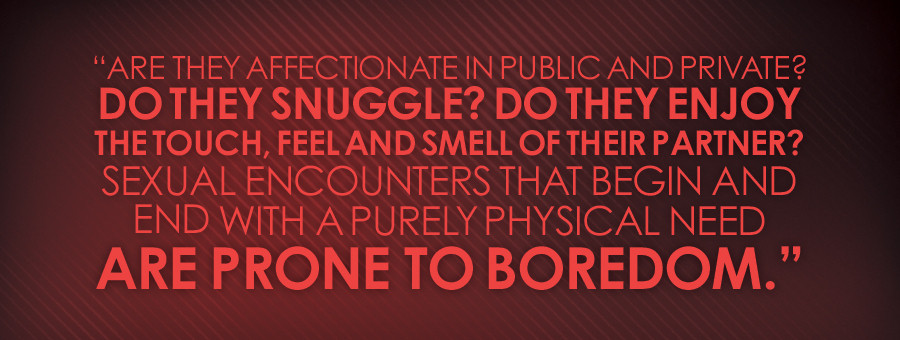
8. Lack Of Emotional Intimacy
“We don’t know how to breathe, we don’t know how to relax and we are so goal, media, experience and image-driven that we have lost something the media doesn’t tout: sexual intimacy. I am a ‘live and let live’ therapist. Fucking, fisting or foursomes are fine if that is what you are into, but another option is missing from a majority of my clients sexual menu. They don’t know how to make love to each other. Taking their time without a scripted agenda. Many years ago I worked with a man in his mid 30’s who adored his partner. He reported they had a decent sexual relationship. But he came too fast for his partner to feel fully satisfied. Through education and hypnotherapy, he learned how to be more in tune with his body as well as his partners’. Five years later, he came back to my office. His partner was having some medical concerns and penetration for more than a few minutes was painful.
Now he was lasting too long and he wanted to become a premature ejaculator again. Hypnotherapy was a useful resource for him before and it worked again like a charm. This guy knew what he wanted and it was sexual connection that worked for the two of them. His ego or the purview of social media didn’t dictate what he should or shouldn’t be doing with his partner between the sheets — or on the kitchen counter. I have no doubt that through the rough patches of their relationship, they will make the necessary adjustments to kids, illness and aging in order to maintain a sexually intimate connection.”
-Rebecca Hope Dnistran, MA, LMFT
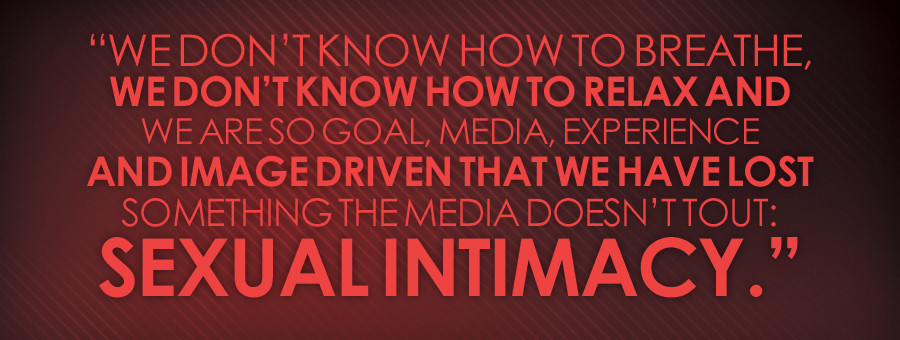
9. Sexual Addiction
“Increasingly I am hearing complaints about compulsive sexual behavior often referred to as sexual addiction. This difficulty can present itself in many ways and at varying levels of severity along a continuum from mild to a severe level of impairment. My approach to addressing it often begins with examining underlying trigger factors, such as poor stress control, family of origin conflicts or drug and alcohol abuse. Once treatment begins, it often includes setting boundaries, impulse control management, coping skills training, fantasy re-direction and relationship counseling where applicable. In certain circumstances where depression is a factor, mood-elevating medications known as SSRI’s may also be a useful adjunct to the behavior therapy process.”
-Mark D. Ackerman, PhD
*Interviews have been condensed and edited.
Read More enriching articles at HuffPost







